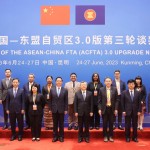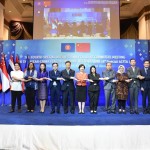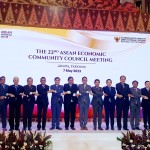Tổng số bài đăng 465.
The 15th Annual Leaders Meeting of the World Economic Forum (WEF) will be held from June 24 to 27, 2024 at the Dalian International Convention Center, China, with the participation of 1,500 high-level delegates, including leaders and senior officials of governments, leaders of corporations/companies, representatives of civil society organizations, and leaders of international organizations. This year's conference has the theme "New Growth Horizons", focusing on 6 main contents: (i) The new global economy; (ii) China and the world; (iii) Enterprises in the era of artificial intelligence; (iv) New development space for industries; (v) Investing in people; (vi) Connecting climate, nature and energy. Minister of Industry and Trade Nguyen Hong Dien accompanied Prime Minister Pham Minh Chinh to attend many events of the Conference and sideline activities such as the Opening Plenary Session; Dialogue with the community of start-ups and innovation businesses; Talks with Chinese Prime Minister Li Qiang; Meeting with Polish President Andrzej Duda, etc.
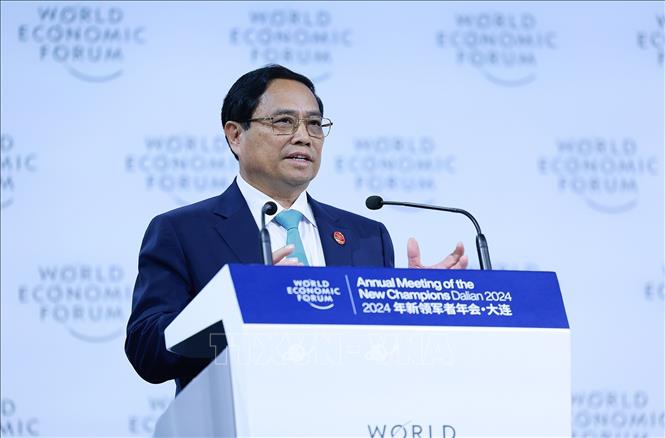
Prime Minister Pham Minh Chinh delivered a speech at the Plenary Session of the 15th Annual Pioneers Meeting of the WEF. Photo: Duong Giang/VNA
Within the framework of the Conference, Prime Minister Pham Minh Chinh and Professor Klaus Schwab (Executive Chairman of the WEF) co-chaired the Dialogue with WEF CEOs on the morning of June 26, 2024 to discuss ways to promote economic growth and cooperation in the context of rapid social, economic, political and technological developments in the world today.
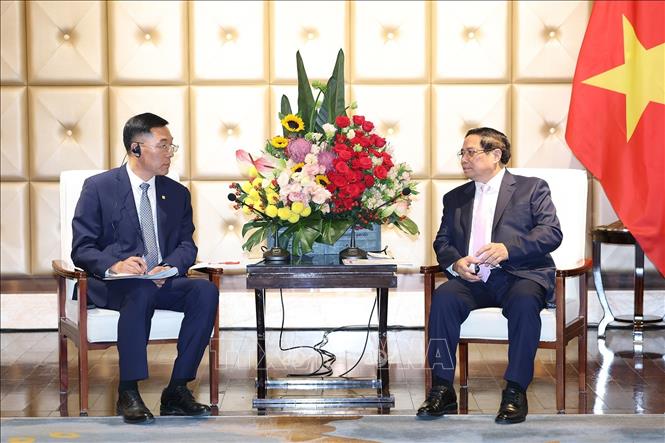
Prime Minister Pham Minh Chinh receives Mr. Ton Vinh Khon, Chairman of Dalian Rolling Stock Company. Photo: Duong Giang/VNA
Regarding ASEAN-related issues, the Summit emphasized the importance of strengthening multilateral processes to promote initiatives on climate change and sustainability by adopting (i) the ASEAN Strategy on Carbon Neutrality; (ii) the ASEAN Blue Economy Framework; and (iii) the Circular Economy Framework for the ASEAN Economic Community. In the face of the increasing impacts of climate change and the twin crises (climate change, pollution and ecosystem degradation), the Summit also discussed a number of important solutions to enhance multilateral cooperation to respond to these impacts, including policy integration at the regional and global levels, climate investment and finance, market-based transformation, natural capital and nature-based solutions, and capacity building and technology transfer.
Discussing the potential of the ASEAN digital economy, the meeting discussed potential cooperation measures and initiatives to complement the ambition of building the ASEAN Digital Economy Framework Agreement (DEFA), which is currently under negotiation and is the world’s first regional digital economy agreement; and noted that ASEAN initiatives such as the ASEAN Single Window, the ASEAN e-Commerce Trust Label Programme, and the Unique Enterprise Identification Number will help boost the ASEAN digital economy. The meeting shared ASEAN’s potential as an attractive region for trade and investment with an expected average real GDP growth of 4.6%, thus digital economic agreements such as DEFA are essential to enhance ASEAN’s attractiveness. The meeting also highlighted the potential of embracing advanced technologies such as AI, which is expected to boost ASEAN’s GDP by an impressive 10 to 18%, reaching a value of around US$1 trillion. Assessing the existing digital divide in the MSME sector, the Conference noted that ASEAN MSMEs face many challenges, including limited access to basic infrastructure such as electricity and internet connectivity, due to low digital adoption by MSMEs (34% of MSMEs apply basic digital tools, 10% use advanced tools such as analytics and automation); noted a number of ASEAN initiatives to support MSMEs in the process of technological transformation, including the ASEAN SME Academy, Go ASEAN and Go Digital ASEAN; emphasized that ASEAN needs a multi-faceted approach to promote innovation and knowledge transfer, helping to enhance the capacity of MSMEs.







